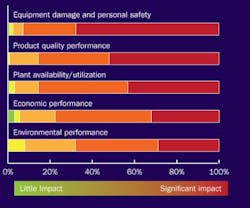Check out ControlGlobal.com on Google+ and Keith Larson's Google+ profile.
In order to gauge current industry views on operator effectiveness, Control together with ABB conducted in January 2012 a reader survey across Control's email database of process automation professionals. Survey respondents acknowledged the potential for operators to significantly influence plant performance, as well as an ongoing need to implement measures that would make them more effective in their jobs. Other data from this exclusive study is included throughout this special report.When asked to what extent better prepared operators could positively influence key performance metrics, respondents placed significant accountability in the hands of the operators. Operators not only have a big impact on availability, equipment damage and personnel safety, but can play a big role in quality, environmental and economic performance as well (chart), according to survey respondents.
But an overwhelming majority of survey respondents also confirmed the increasing scope of board operator responsibilities, with more than three-fourths indicating a growing workload (chart). This trend indicates an already urgent and growing need for companies to do all they can to make their operators more effective in their daily tasks.
In terms of survey demographics, a total of 123 responses were received from a range of process industry verticals, including chemicals manufacturing (27%), mining, metals and materials (11%), oil and gas production (10%), life sciences and pharmaceuticals (10%), electric power generation (10%), food and beverage manufacturing (9%), pulp and paper manufacturing (8%), petroleum refining (7%) water and wastewater treatment (5%) and engineering services (4%).
And while other world regions are represented in the study, the majority of respondents (85%) were from North America; 8% were from Europe, Middle East and Africa (EMEA); 6% from Asia; and 2% from South America. The majority of respondents' titles were engineering related (62%), with maintenance (9%), operations (9%), administration (7%), technician (7%) and unspecified (7%) titles also represented.
About the Author
Keith Larson
Group Publisher
Keith Larson is group publisher responsible for Endeavor Business Media's Industrial Processing group, including Automation World, Chemical Processing, Control, Control Design, Food Processing, Pharma Manufacturing, Plastics Machinery & Manufacturing, Processing and The Journal.





